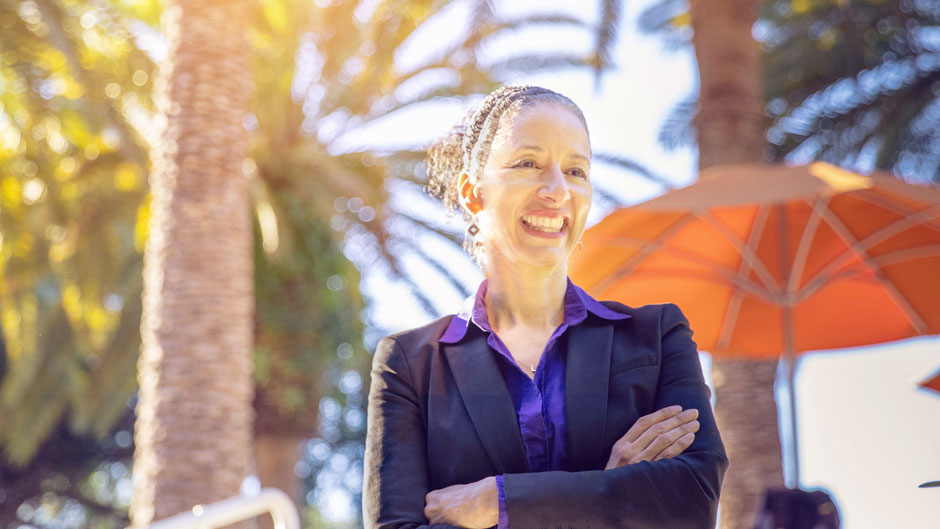Education should be a tool for transformation.
For individuals
For communities.
That is the core of Dean Laura Kohn-Wood’s mission for the University of Miami’s School of Education and Human Development.
Building on the well-laid foundation of integrating educational, psychological, and physical wellbeing into formal education, established by former Dean Isaac Prilleltensky, Kohn-Wood intends to harness the immense talent, research skills, and know-how of her faculty, staff, and students to solve real-life problems.
“My hope is that we can become the school that is all about transformation across the educational, psychological, and physical domain for individuals, organizations, and communities,” said Kohn-Wood.
The School is well on its way. Its three major departments – Teaching and Learning, Sports and Kinesiology, and Educational and Psychological Studies – all have engaged faculty carrying out important research.
These include how to communicate hurricane information to underserved populations, how to use new technology to help determine the executive functions of Parkinson’s patients, and analyzing how the collection, processing and manipulation of data affects various populations.
The School not only attracts students who want to be teachers, administrators, or sports managers, but many who are interested in making a change in the world by applying community psychology to their work lives. Many of them go on to work for non-governmental organizations and non-profits.
Kohn-Wood, who began her post in early July, held several meetings with her staff and faculty to hear their views and fine tune her strategic plan for the future of the school. She talked to about 60 members of the school in small dinners and lunches.
What arose from many of those discussions was a consensus that the strength of the different departments’ work could coalesce to create interdisciplinary projects “to solve complex human problems.”
“So we are thinking of well-being across the lifespan of a person,” she said. “For example, we have faculty in Teaching and Learning developing innovative K-12 instruction for teaching science and then faculty in Kinesiology and Sports Sciences using robots for different functions—they then come together to use robots to teach children about science.”
Similar opportunities are plentiful, she said.
Community engagement is also paramount for the School. Kohn-Wood is already reaching out to community entities including Miami-Dade County Public Schools to promote the School as the premier education school and create partnerships that are mutually beneficial.
A Feb. 20 event featuring Miami-Dade County Public Schools Supt. Alberto Carvalho and Dave Lawrence, former Miami Herald publisher and early childhood champion, is already in the works.
At a time when school systems throughout the country are experiencing teacher shortages, the School has seen a rise in the number of students wanting to become elementary school teachers, said Kohn-Wood, who was a vocal proponent for the passing of Miami-Dade County’s Amendment 362 to increase teacher’s pay.
A new program at the School should help. The Supporting Educators’ Academic Literacies and Enhanced Discourse (SEALED) Project at UM offers 95 percent tuition funding to Miami-Dade County Public Schools middle and high school teachers who wish to receive a UM Master’s degree in one of three areas: Teaching English to Speakers of Other Languages (TESOL), Special Education, or Education and Social Change.
Kohn-Wood is also very enthusiastic about the implementation of the Intergroup Dialogues program at UM in which she played a major role.
Started by the Office of Institutional Culture and offered through the the School of Education and Human Development, these classes promote small discussions where participants learn skills to talk with each other and learn about their differences and life experiences so that they can understand the other person’s point of view.
The Intergroup Dialogues courses are part of the Culture of Belonging Initiative which was outlined by UM President Julio Frenk. The initiative seeks to create a culture where everyone feels they can contribute.
“A Culture of Belonging is razor focused on how people can add value and feel valued,” Kohn-Wood said.
She feels that through these dialogues students, faculty, and staff will understand that adding equity and access for all groups (no matter their gender, nationality, race, or sexual orientation) not only enhances their quality of life but also enriches our society.
“Education has traditionally been the route for social mobility for generations,” Kohn-Wood said. “Education can play a significant role in moving the needle and advancing mobility for individuals and communities if we can figure out how to do it right.”

